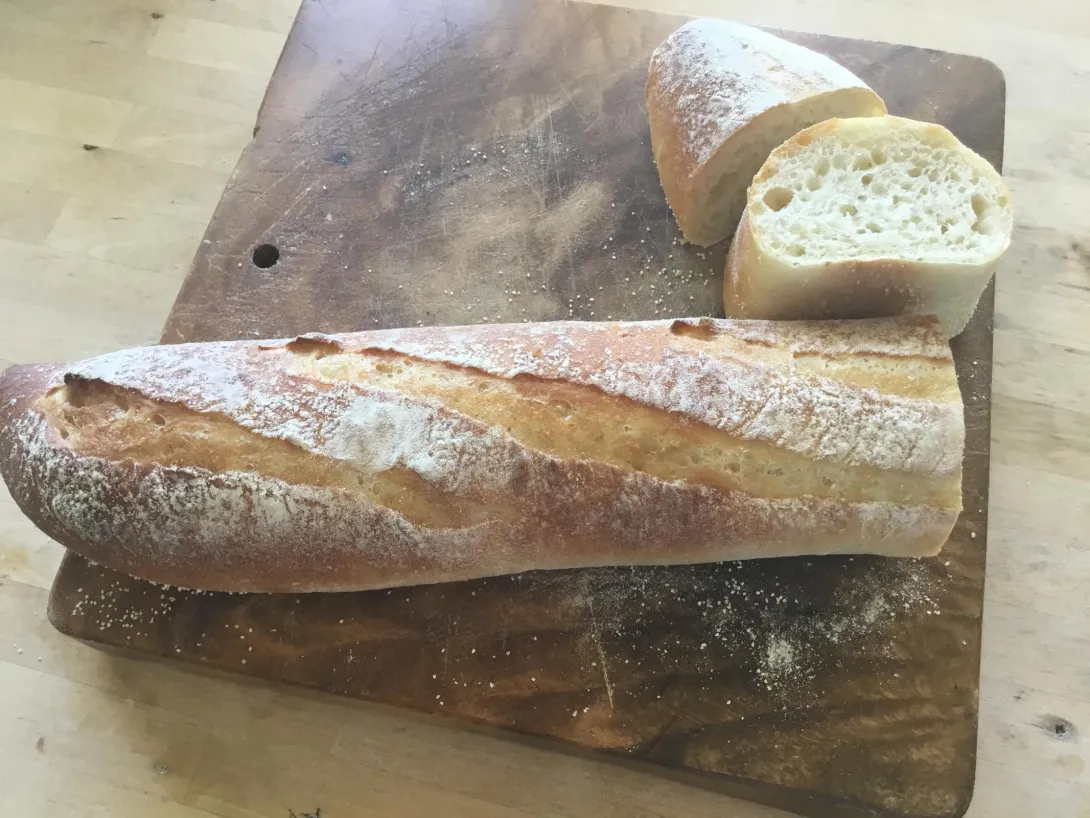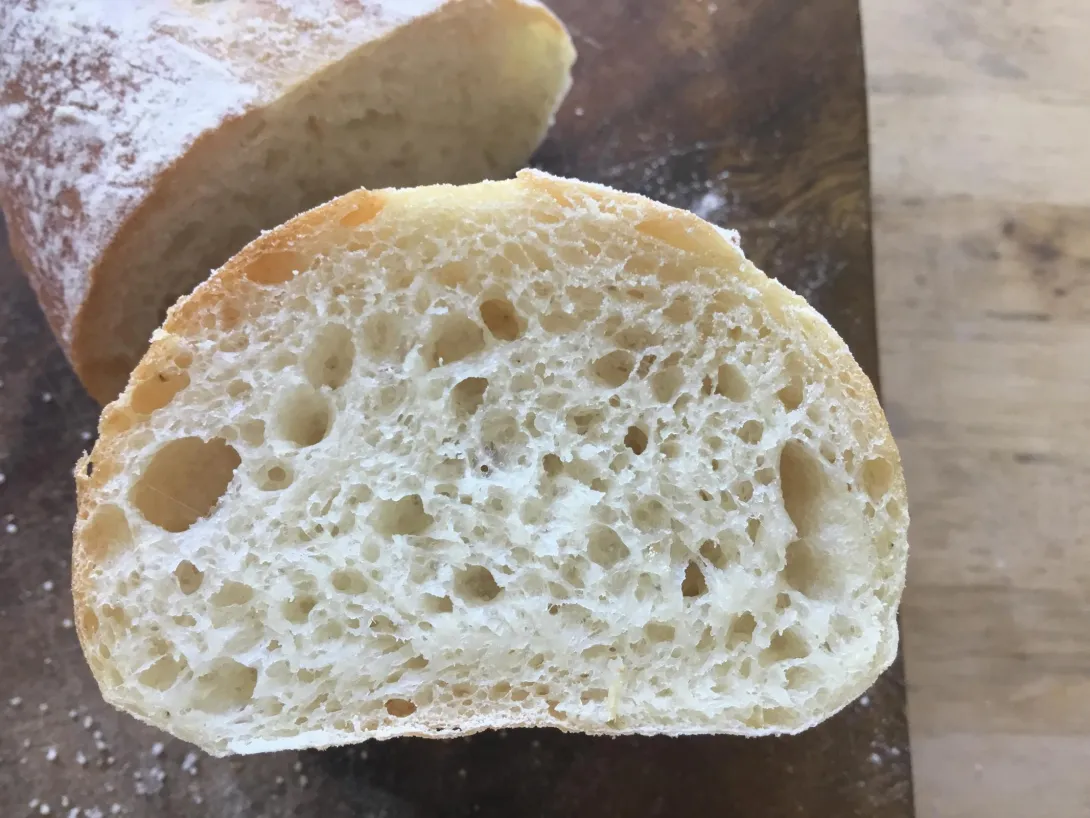
Hello everyone
i have never had this problem before but for the last few weeks I cannot get my slashes to stay open.
74% hydration, 1.95% salt. I have recently changed to a new brand of salt that is finer than previous but other than that recipe and technique are the same used when slashes used to be fine...
For 10 x 350g baguettes - 1978g flour, 1470g water, 14g instant yeast, 68g salt, 30g roasted malt powder
‘technique;
- Add water, yeast, malt to bowl, let sit for a few minutes
- Add flour
- Mix on slow 4 mins, medium 3 minutes
- Cover and rest 20mins
- Add salt
- Mix on slow 1 min, medium 6 minutes
- Into proving cabinet
- Leave 45 minutes, fold and stretch
- Leave 45 minutes, fold and stretch
- Leave 45 minutes
- Pre-shape
- Rest 15 minutes
- Final shape, place in couche
- Final prove 35 minutes
- Oven preheated to 220 Celsius, pre-steamed (has dedicated water supply with manually operated steam button)
- Place baguettes on tray
- Slash
- Into oven, hold steam button for 15 seconds
- Set timer for 16 minutes
- At 8 minute mark open oven door briefly to release steam
- At 16 minute timer remove from oven and cool
Does anyone have any ideas?
Many thanks in advance
Image

10 at a time- is this normal ? Did anything else change ?
Yes I freeze them and then refresh in the oven for 10 mins so always have hot bread on hand. The kids love it.
The only other change is the addition of 30g of roasted malt per 3.5kg of dough weight.
Ok so 3 things changed since they used to work (bursts along the scores). First more fine grain salt. Second, the freezing and defrosting before baking and thirdly some non-diastatic (must be) roasted malt. One of these must be the culprit. My guess would be the freezing of the loaves. I never freeze dough but I know its popular. Getting a baguette to burst is a fine tuned operation - I imagine if I froze a loaf to expect the unexpected !
Sorry I meant I freeze after baking not before... so rule that one out
More fine grain salt though? Maybe acting as a surface inhibitor?
I've done course fine etc and just think it dissolves no matter the grain. Maybe one of our more techy members has some thoughts but my instinct is to think youre barking up the wrong tree. However if theres only 3 diffs here try eliminating one by one. Ie freeze with normal salt and no malt. If it still fails to burst then its probably the freezing bit. Etc etc
Any chance there’s been a change to the temperature of the bulk fermentation or final proof? Anytime I’ve had poor grigne or ears it has been because of relative overproofing.
Benny
so maybe your new salt has different percentage of other minerals. If I remember right table salt is 40% sodium but different sea salts vary quite a bit in sodium content.
So... when I checked back to my notes from when my slashes were good I see, ah ha, different hydration. My problem loaf was at 74% whereas the ones that worked were 71%.
So have done three batches today at 71%:
Exact same recipe (except hydration) as yesterday, same environment, same timings and techniques.
Exact same result all three batches. Very happy with slashes. How could 3% extra hydration cause the difference?
Well that looks much better.
3% hydration can make a difference in a few ways. It will speed fermentation compared with a lower hydration dough with the same flours and inoculation. Being less stiff, its skin may not be as firm to open up as cleanly.
But want to ask question - how many loaves did the OP bake this time. I sort of hinted before at '10 loaves at once' that's a ton of dough. As part of eliminating variables we need to think about the load on the oven too. If 10 loaves that failed then tweeked something and tried the tweak as couple of loaves in the oven - well not comparing apple to apple anymore. That will make huge difference. I want to know if the OP tried this hydration tweek above with 10 loaves again ?
Very good question Geremy.
Benny
Yes same number of loaves. Everything exactly the same except a different day (but similar weather) and different hydration as stated previously.
The higher your hydration with baguettes, the more difficult to slash and get good ears. You can get exceptionally open crumb at much lower numbers - 66%-68%. If you want to stick with higher numbers my advice would be to proof them 3/4, then refrigerate for at least 30 minutes to 1 hr to allow the dough to firm up. That will make scoring much easier.
Here in Mexico, we say "A hard dough is a safe dough. A soft dough, who knows?"
The real thing is that you cannot score the same way with a very hydrated dough than with a stiffer dough. The deph of the cut must vary. At this point is also important in which point of the fermentation you bread is. If the dough is overfermented, it's difficult to get a nice spring, you should score more superficially.
A trick that works quite well for scoring nicelly is just place your baguettes 10-15 minutes in the fridge just befor baking. Then the crust gets harder, and it's easier to score in the right way.